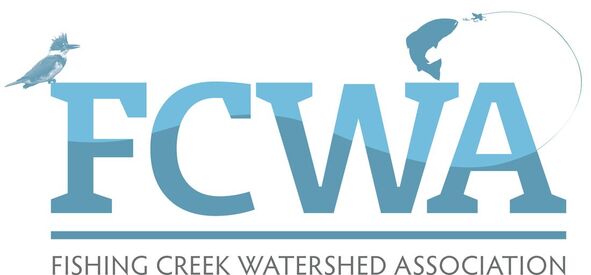About Us
The Fishing Creek Watershed Association (FCWA) is made up of volunteers working together and coordinating efforts to improve the quality of the watershed. FCWA supports local, state and federal agencies, municipal, county, state and federal officials, business and industry, educational institutions and any other groups with similar interests and goals.
FCWA Supports The Following Objectives Within The Watershed:
|
Reduction of Soil Erosion - A major source of pollutants to Fishing Creek is sediment created from human activities. FCWA encourages best management practices, including contour farming, forest stream buffers, sustainable timbering practices, and stream bank fencing. The Association assists in educating landowners and helping to uncover funding sources for environment friendly practices to reduce soil erosion.
Control of Flood Damage - Coupled with proper planning, sound conservation and environmental practices can mitigate flood damage within the Fishing Creek Watershed. FCWA promotes education and provides information to help lessen the effects of high water and reduce the risk of flooding. For instance, maintenance of wetlands and other natural water catchment areas minimizes runoff during heavy rains by providing a place for water to travel without adding pressure on the stream itself. Restoration of Wildlife - Healthy habitats and healthy streams are the means to a re-invigorated wildlife population, including normal insect hatches, healthy fish populations, natural forests, wild meadows, and stable bird, reptile and mammal populations. FCWA provides education and projects to improve wildlife habitat and population. Improvement of Stream Habitat - Healthy watershed habitat especially near streams and tributaries is critical to the ecosystem. FCWA uses education and existing programs to provide information and assistance to landowners for habitat improvement such as vegetation (riparian buffers) planted along streams, streambank structures, streambank fencing, and agricultural crossings. These projects help protect our streams and drinking water supply from pollution and improve habitat both in and along the stream banks. |
Protection and provision of recreation areas of great natural beauty - An ecologically sound environment is the foundation for activities such as camping, biking, hunting, fishing, and hiking. By encouraging people, organizations, and communities to work together, FCWA supports planning and implementation of outdoor recreation within the Watershed.
Elimination of Stream Pollution - Acid rain is an identified problem affecting the Watershed’s environment. By monitoring the chemical, physical, and biological qualities of the watershed, FCWA provides the qualitative and quantitative data necessary to carryout programs to alleviate pollution effects. One example project is limestone insertion directly into streambed to improve water alkalinity and reduce the effects of acid runoff. Increasing Soil Health - As food production demands rise, keeping our soil healthy and productive is critical. Farming soil health principles and systems such as no-till, cover crops and diverse rotations, increase farmers' soil organic matter and improve microbial activity. As a result, farmers are sequestering more carbon, increasing water infiltration, improving wildlife and pollinator habitat—all while harvesting better profits and often better yields. This can be down-scaled to create benefits in backyard vegetable and flower gardens as well. Eliminating Runoff - Work to protect our streams and rivers assures long term use and benefit to the public. After it rains, stormwater picks up pollutants as it flows over parking lots and streets, degrading water quality and stream health. Alerting municipal officials of potential runoff pollution problems you see around the watershed can help lead to improved conditions such as plantings or rock stabilization. |
